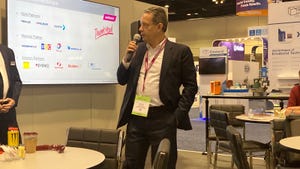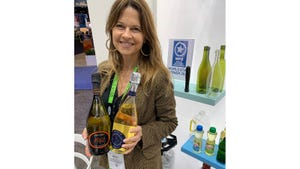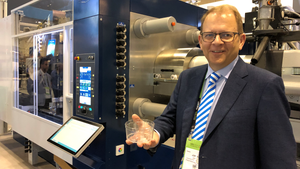Satisfying customers and suppliers key to success for New Zealand molder
June 6, 2016
What started off as a modest operation in a garage in small town New Zealand molding coat hangers using a single 46-tonne Battenfeld press has over the course of the last 32 years transformed into a leading global supplier of housewares and drinking bottles, with customers in more than 80 countries. 90 percent of production is currently exported.
|
Sistema Plastics Managing Director Brendan Lindsay: Overcoming the challenges of a remote location and high costs through innovation and close customer and supplier relations. |
Sistema Plastics designs and builds automation equipment in-house, as well as tooling. Here, Arnold demonstrates its moves. |
What’s more, annual revenue growth of 20–25% doesn’t look like abating any time soon at Sistema Plastics. The company is consolidating operations at its six current sites occupying combined floor area of 22,000 square meters (237,000 square feet) to a mammoth 55,000-square meter (592,000-square foot) facility near Auckland International Airport that will allow it to triple in scale. The expansion entails an investment of $NZ120 million ($83 million).
Initially, Sistema will add 13 new Sumitomo all-electrics to its stable at the new facility, boosting injection machine number to 71 in all. The company also runs two Aoki injection stretch-blow machines.
Founder and Managing Director Brendan Lindsay spoke with PlasticsToday recently at company HQ in Penrose, Auckland, offering insights into the company’s success story and underlying strategy. “Being remote from both our customers and suppliers, we need to take good care of both,” says Lindsay. “Even if that means traveling 48 hours to and from the UK for a single meeting.”
The same applies to key suppliers. “The supply base is just as important as the customer base, in some ways more important as they are the ones that help us out when we have a problem,” says Lindsay. “That’s something our customers won’t do.”
In the early days, says Lindsay, “People thought we were crazy setting up a houseware manufacturing firm in New Zealand. “They literally laughed at us!” But Sistema was able to convince Japanese machine builder Sumitomo that it was on to something. “They’ve given us strong support from day one and their machines dominate our production assets.” Sistema also operates three Engel hydraulic machines (two 1300-tonne and a single 650 tonne press) for molding large storage bins, however, given the lack of large-tonnage Sumitomo machines for the task.
Be it is resin supplier Hanwha Total or key customers such as Tesco, Sistema prefers to deal directly with its business partners. “We have our own offices in North America, Europe and Australia, and we take our new product concepts directly to them,” says Lindsay. “Such is their trust in us that they’ve ordered our latest product based on samples without evening seeing the pricing, labeling or colors. This tells us their appetite for new products, and importantly for our products.” Sistema’s new range of kitchen benchtop storage containers will employ Tritan copolyester resin from Eastman.
Sistema also regularly visits its Chinese carton manufacture to maintain the relationship and ensure quality requirements are adhered to. “There’s no five-color printer in New Zealand and it’s hard for them to visit us.”
The new plant under construction in Auckland will be able to accommodate 150 machines but as previously mentioned, capacity will be tripled. “We are installing larger machines to enable higher cavitation,” says Lindsay. Three 550-tonne Sumitomo all electrics are one the way, which will be used with eight-cavity tooling. Previously the largest machine at Sistema was a 450-tonne press.
Besides dealing directly with its suppliers and customers, Sistema is also reliant on internal resources for the majority of its tooling and automation needs. Be it drinking bottle cap assembly and screw-on, or take-out and labelling of storage bins, production cells in Sistema’s plants are designed in-house. The production cells for the two large Engel machines are affectionately named dueling Arnie (Schwarzenegger) and Chuck (Norris).
Tooling is also fabricated in-house. “We build around 50 new tools built per year and more and more of them are two shot molds, or complex tooling for unique bottle cap designs,” says Chief Operating Officer Drew Muirhead. “There are good toolmakers in New Zealand but they are hard to find,” he notes.
Sistema markets its entire product range as being phthalate-free. “This strategy extends to the random copolymer polypropylene we use, which is polymerized via a phthalate-free catalyst,” says Lindsay. “We also focus on the mid to high end of the market and avoid the cheap and nasty. We view product innovation and speed to market as keys to success given our remote location,” he adds. Some products are taken from concept to commercial in as little as three months.”
As with any hugely successful brand, Sistema has its fair share of ‘emulators.’ “We’ve seen copies from Peru, China, Mexico and Poland but we’ve managed to keep these off the market,” says Lindsay. “We have a full-time staff member traveling to exhibitions throughout the world, as well as to $2 stores.”
Sistema also faces strong challenges from leading manufacturers in the market. “They get their materials at lower cost, while we need to have raw material shipped from overseas and then we have to ship our products back to the US. It’s hard to penetrate the US with such barriers,” concedes Lindsay. But he’s counting on Sistema’s innovative streak to overcome such challenges.
Oh and the coat hanger business? With its emphasis on building and maintaining relationships, Sistema is still making them to this day and it dominates the local market with an 85 percent share. “We aim to keep it that way,” says Lindsay.
You May Also Like



